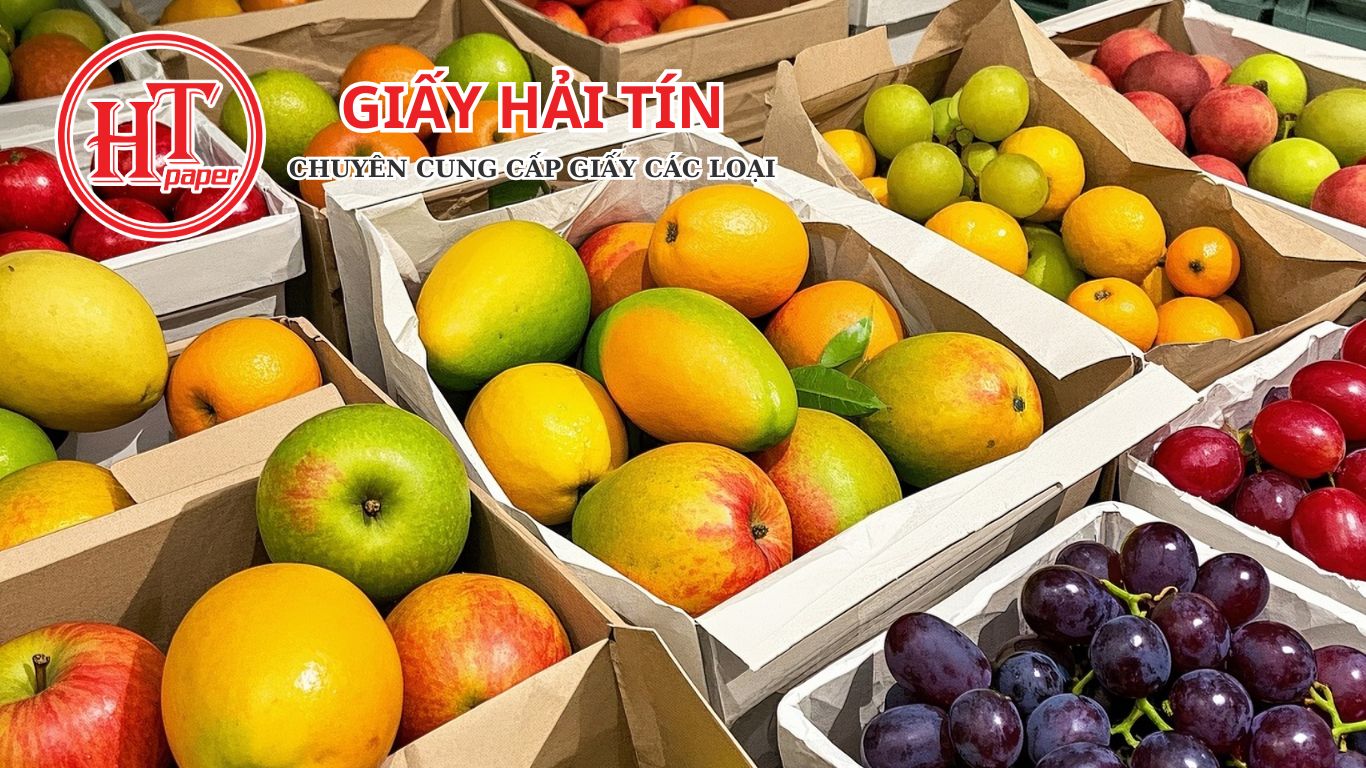1. Giới Thiệu Về Giấy Gói Trái Cây
Trong ngành nông nghiệp hiện đại, giấy gói trái cây đóng vai trò quan trọng trong việc bảo quản nông sản, duy trì chất lượng, ngăn ngừa hư hỏng và tăng khả năng tiêu thụ. Với sự phát triển của các phương pháp bảo quản sinh học, sử dụng giấy gói trái cây trở thành xu hướng được nhiều doanh nghiệp và nông dân áp dụng.

2. Lợi Ích Của Giấy Gói Trái Cây
2.1. Bảo Vệ Bề Mặt Trái Cây
Trái cây sau thu hoạch dễ bị trầy xước hoặc dập nát khi vận chuyển. Giấy gói trái cây giúp giảm thiểu nguy cơ hư hỏng và duy trì hình dáng tự nhiên, giúp trái cây hấp dẫn hơn khi đến tay người tiêu dùng.
2.2. Ngăn Ngừa Côn Trùng, Vi Khuẩn
Một số loại giấy gói trái cây có khả năng kháng khuẩn, giúp giảm nguy cơ nhiễm bệnh do vi sinh vật gây ra, bảo vệ chất lượng trái cây lâu dài. Điều này đặc biệt quan trọng đối với các loại trái cây dễ bị hư hỏng như xoài, nho, táo.
2.3. Kiểm Soát Độ Ẩm
Một số loại giấy có khả năng hút ẩm tốt, giúp ngăn chặn tình trạng nấm mốc hoặc mất nước trong quá trình lưu kho và vận chuyển. Nhờ đó, trái cây luôn giữ được độ tươi ngon và màu sắc tự nhiên.
2.4. Giúp Trái Cây Duy Trì Chất Lượng Lâu Hơn
Khi sử dụng giấy gói trái cây, trái cây giữ được độ tươi, hạn chế báo khí ethylene giúp làm chậm quá trình chín. Điều này giúp kéo dài thời gian bảo quản, giảm thất thoát nông sản, đặc biệt trong quá trình xuất khẩu.
.jpg)
3. Các Loại Giấy Gói Trái Cây Phổ Biến
3.1. Giấy Kraft
Loại giấy chắc, có khả năng thấm hút tốt, thường dùng để gói trái cây khi vận chuyển xa. Giấy kraft thân thiện với môi trường, có thể tái chế và phân hủy nhanh chóng.
3.2. Giấy Pelure
Giấy mỏng, nhẹ, thường dùng để bọc trái cây nhạy cảm như đào, dâu tây. Nhờ đặc tính mềm mịn, giấy pelure không làm trầy xước bề mặt trái cây.
3.3. Giấy Wax (Giấy Phủ Sáp)
Giúp chống thấm nước, duy trì độ ẩm tốt cho trái cây nhạy cảm. Loại giấy này thích hợp để bọc trái cây như cam, chanh, táo nhằm bảo vệ khỏi độ ẩm cao.
3.4. Giấy Chống Khuẩn
Một số loại giấy có phủ lớp chống khuẩn, giúp ngăn ngừa vi khuẩn và nấm mốc phát triển, đảm bảo an toàn vệ sinh thực phẩm.
4. Cách Chọn Giấy Gói Trái Cây Phù Hợp
- Chọn giấy có độ bền và thân thiện môi trường: Ưu tiên các loại giấy có thể tái chế, phân hủy sinh học để giảm tác động tiêu cực đến môi trường.
- Kiểm tra tính an toàn thực phẩm: Giấy gói trái cây phải đảm bảo không chứa hóa chất độc hại, an toàn khi tiếp xúc trực tiếp với thực phẩm.
- Lựa chọn loại giấy theo đặc tính từng loại trái cây: Với trái cây có vỏ mềm nên chọn giấy pelure, còn với trái cây xuất khẩu cần giấy chống khuẩn.
5. Xu Hướng Phát Triển Của Giấy Gói Trái Cây
Hiện nay, xu hướng sử dụng giấy gói trái cây thân thiện với môi trường đang ngày càng được quan tâm. Các doanh nghiệp sản xuất giấy đang nghiên cứu các loại giấy có nguồn gốc từ sợi tự nhiên, có thể phân hủy sinh học hoàn toàn nhằm giảm rác thải nhựa. Ngoài ra, giấy gói có bổ sung chất kháng khuẩn tự nhiên từ tinh dầu tràm, bạc hà cũng đang được ứng dụng rộng rãi.
6. Kết Luận
Việc sử dụng giấy gói trái cây là giải pháp hữu ích giúp nâng cao chất lượng nông sản, tăng thời gian bảo quản và tối ưu quy trình vận chuyển. Đối với doanh nghiệp nông sản, đây là yếu tố quan trọng góp phần nâng cao giá trị sản phẩm và khả năng cạnh tranh trên thị trường. Lựa chọn giấy gói phù hợp không chỉ bảo vệ trái cây mà còn giúp doanh nghiệp đáp ứng được tiêu chuẩn xuất khẩu, hướng tới một nền nông nghiệp xanh và bền vững.
-----------------------------------------------------
Tham khảo sản phẩm giấy : tại đây
Thời gian làm việc : Thứ 2 - Thứ 7 : 08:00 am - 05:30 pm
-----------------------------------------------------
Hải Tín Paper- Chuyên cung cấp giấy sơ đồ ngành may mặc
Email: haitinco@gmail.com - kinhdoanh@haitinpaper.com
Hotline:
Tiếng Việt : 0798.909.808
CHINESE : 0938 808 998
ENGLISH : 0799.909.808